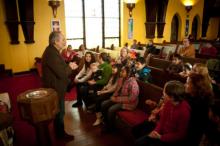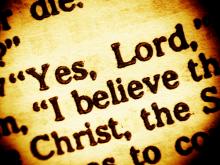religious practice

“I am sure the largest currency used on the black market, for [buying] haram things, is the U.S. dollar. So if the question of a currency being haram is what it is used for, the dollar would be the most haram,” Sabree said. “Just because a tool is used for something haram, doesn’t mean the tool is haram.”

As Congress makes a final attempt this fall to act on comprehensive immigration reform, the debate is focusing on “securing” our borders and offering a path to citizenship to the 11 million residents here without proper documentation. These politicized arguments, however, don’t see the forest for the trees.
We’re not viewing the broader impact that immigration has had on American society, especially since the last major immigration reform of the 1960s. In particular, we’re missing the way immigration is transforming the religious life of North America.
We commonly view immigration as introducing large numbers of non-Christian religions into U.S. society. True, because of immigration in the last half century, America has become the most religiously diverse country in the world, with thousands of mosques and temples dotting our religious landscape.
On my first Patriots’ Day in Boston, I was enjoying lunch with several colleagues when someone rushed into the restaurant: There had been an explosion at the finish line of the Boston Marathon. Moments later, caravans of ambulances and police cars raced, and the reports of casualties rolled in.
In the hours and days that followed, social media became for me, and many others, a sacred space to share our prayers and words of disbelief.

I am part of a liturgically worshiping tradition. There are days I wish I wasn’t; days when our Kyrie is lacking splendor and our Eleison feels redundant; moments that I wish we could get to the important stuff — my inspired and infallible message (I kid) — and toss the unending Psalm or Prayers of the Church.
And then there are the other times, when I am guiltily reminded that cutting the creed means missing out on the same words spoken by millions of believers before me. Or when the music just all works and my heart is stirred by the Hallelu– (shhh, its Lent) Chorus.
So I like to remind my community of believers from time to time why we do what we do. I have long felt the risk of liturgy is that it becomes rote narration, a thoughtless speechifying of sorts. So that this might be avoided, here are my thoughts on the creeds and why a corporate confession of faith is still valuable today.